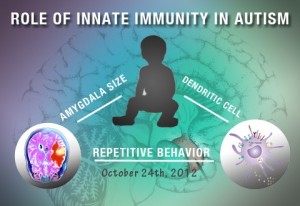Check out other stories from the Latest News
Amygdala Size, Repetitive Behaviors Linked to Immune Cells
By Shana R. Spindler, Ph.D. on October 24, 2012

Background: Previous research has shown that Autism Spectrum Disorder (ASD) correlates with abnormal activation and function of the innate immune system, a population of cells that provides an initial defense against foreign organisms. How innate immune system regulation is linked to ASD is an active area of investigation.
What’s New: Researchers at the MIND Institute (University of California, Davis) reported in the 17 October online edition of Brain, Behavior, and Immunity that dendritic cells—an important cell population within the innate immune system—are significantly increased in children with ASD. The researchers examined 57 children, ages 2-3 years, and 29 age-matched controls. For both groups, the researchers found a positive correlation between circulating dendritic cell number and size—as measured by MRI—of the amygdala, a brain structure involved in processing emotional events and memory. Additionally, the researchers report that children with ASD who have increased circulating dendritic cells also have more pronounced repetitive behaviors, according to ADOS assessment. For children with a regressive form of ASD, the researchers found a positive association with a specific sub-population of dendritic cells.
Why It’s Important: This is the first study to show a correlation between innate immune system regulation, structural changes in a brain region called the amygdala, and behavioral severity. Little is known about the mechanisms that link the immune system to ASD pathogenesis. This study supports the hypothesis that innate immune system dysfunction may affect the development and/or maintenance of brain structures that control behaviors associated with ASD.
Help me understand :
| Source(s) : |
| Tweet |

